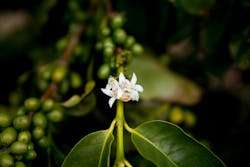Researchers Release Public Genome Sequence For Common Coffee Species
Researchers at the University of California, Davis, in January released the first public genome sequence for Coffea arabica (C. arabica), the species responsible for more than 70 percent of global coffee production.
“This new genome sequence for C. arabica contains information crucial for developing high-quality, disease-resistant coffee varieties that can adapt to the climate changes that are expected to threaten global coffee production in the next 30 years,” said Juan Medrano in the project’s news release. Medrano is a geneticist in the University California, Davis, College of Agricultural and Environmental Sciences and co-researcher on the genome project. The sequencing was conducted through a collaboration between Medrano, plant scientists Allen Van Deynze and Dario Cantu, and postdoctoral research scholar Amanda Hulse-Kemp, all from the University of California, Davis.
“We hope that the C. arabica sequence will eventually benefit everyone involved with coffee — from coffee farmers, whose livelihoods are threatened by devastating diseases like coffee leaf rust, to coffee processors and consumers around the world,” added Medrano.
C. arabica is a hybrid cross derived from two other plant species, C. canephora (robusta coffee) and related C. eugenioides. Unlike many plants and humans, which have only two chromosome sets, C. arabica’s complex genome has four sets of chromosomes.
The study used a combination of the latest technologies for genome sequencing and genome assembly from Dovetail Genomics of Santa Cruz, California, revealing an estimated 70,830 predicted genes.
Details of the sequence were presented at the Plant and Animal Genome Conference in San Diego on January 15. The new genome sequence is available for immediate use by scientists and plant breeders worldwide on Phytozome.net, the public database for comparative plant genomics coordinated by the U.S. Department of Energy’s Joint Genome Institute. Funding for the sequencing was provided by Suntory group, an international food and beverage company based in Tokyo.
“We anticipate that functional analysis of the genes identified by the C. arabica sequencing will lead to development of new, disease-resistant coffee varieties with enhanced flavor and aroma characteristics,” said Yoshikazu Tanaka, senior general manager for Suntory Global Innovation Center Limited, in the news release.
California Connection
Sequencing of the C. arabica genome is particularly meaningful for California, where coffee plants are being grown commercially for the first time in the continental U.S. and where specialty-coffee industry is emerging.
During the project, the university’s research team was introduced to farmer Jay Ruskey. Ruskey, with assistance from the University of California Cooperative Extension farm advisor Mark Gaskell, was growing the first commercial coffee plants in the continental United States at his Good Land Organics farm near Santa Barbara, CA. Although coffee is a tropical crop that is traditionally grown around the world in a geographic belt that extends no more than 25 degrees north or south of the equator, coffee trees at Ruskey’s Central Coast farm are producing high-quality coffee beans at a latitude about 19 degrees north of any other commercial coffee plantations. Ruskey has also planted coffee trees on 20 other farms stretching from San Luis Obispo south to San Diego, creating what he hopes will be a new specialty-coffee industry for California.
Alongside Ruskey, researchers collected DNA and RNA samples from different tissues and developmental stages of 23 Geisha coffee trees growing at Good Land Organics. Geisha, known for its unique aromatic qualities, is a high-value C. arabica variety that originated in the mountains of western Ethiopia.
Plant material from one of the trees — UCG-17 Geisha — was used for developing the C.arabica genome sequence.
Future Plans
Going forward, the researchers plan to focus on identifying genes and molecular pathways associated with coffee quality, hoping to better understand the flavor profiles of Geisha coffee. They have already sequenced samples from 22 other Geisha coffee trees to learn about the genetic variation within that variety and among 13 other C. arabica varieties, which are important for developing plants that can resist disease and cope with other environmental stresses.
